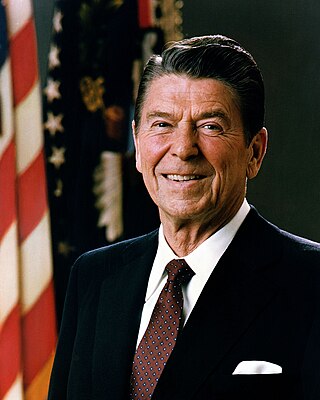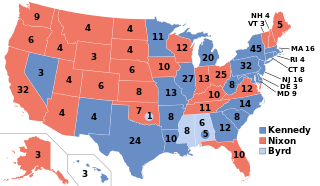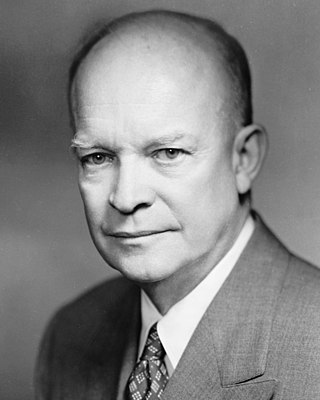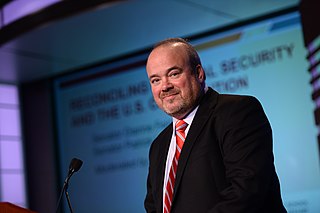Related Research Articles

Ronald Wilson Reagan was an American politician and actor who served as the 40th president of the United States from 1981 to 1989. A member of the Republican Party, his presidency constituted the Reagan era, and he is considered one of the most prominent conservative figures in American history.

Thomas Woodrow Wilson was an American politician and academic who served as the 28th president of the United States from 1913 to 1921. A member of the Democratic Party, Wilson served as the president of Princeton University and as the governor of New Jersey before winning the 1912 presidential election. As president, Wilson changed the nation's economic policies and led the United States into World War I in 1917. He was the leading architect of the League of Nations, and his progressive stance on foreign policy came to be known as Wilsonianism.

The 1960 United States presidential election was the 44th quadrennial presidential election, held on Tuesday, November 8, 1960. The Democratic ticket of Senator John F. Kennedy and, his running mate, Senate Majority Leader Lyndon B. Johnson narrowly defeated the Republican ticket of incumbent Vice President Richard Nixon and his running mate, U.N. Ambassador Henry Cabot Lodge Jr. This was the first election in which 50 states participated, marking the first participation of Alaska and Hawaii, and the last in which the District of Columbia did not. This made it the only presidential election where the threshold for victory was 269 electoral votes. It was also the first election in which an incumbent president—in this case, Dwight D. Eisenhower—was ineligible to run for a third term because of the term limits established by the 22nd Amendment.

Gerald Ford's tenure as the 38th president of the United States began on August 9, 1974, upon the resignation of President Richard Nixon, and ended on January 20, 1977. Ford, a Republican from Michigan, had been appointed vice president on December 6, 1973, following the resignation of Spiro Agnew from that office. Ford was the only person to serve as president without being elected to either the presidency or the vice presidency. His presidency ended following his narrow defeat in the 1976 presidential election to Democrat Jimmy Carter, after a period of 895 days in office.
These are the references for further information regarding the history of the Republican Party in the U.S. since 1854.

Dwight D. Eisenhower's tenure as the 34th president of the United States began with his first inauguration on January 20, 1953, and ended on January 20, 1961. Eisenhower, a Republican from Kansas, took office following his landslide victory over Democratic nominee Adlai Stevenson in the 1952 presidential election. Four years later, in the 1956 presidential election, he defeated Stevenson again, to win re-election in a larger landslide. Eisenhower was limited to two terms and was succeeded by Democrat John F. Kennedy, who won the 1960 presidential election.
Stephen Skowronek is an American political scientist, noted for his research on American national institutions and the U.S. presidency, and for helping to stimulate the study of American political development.
The bibliography of Ronald Reagan includes numerous books and articles about Ronald Reagan. According to J. David Woodard, a political science professor, more than 11,000 books on Reagan have been published.

George H. W. Bush's tenure as the 41st president of the United States began with his inauguration on January 20, 1989, and ended on January 20, 1993. Bush, a Republican from Texas and the incumbent vice president for two terms under President Ronald Reagan, took office following his landslide victory over Democratic nominee Michael Dukakis in the 1988 presidential election. His presidency ended following his defeat in the 1992 presidential election to Democrat Bill Clinton, after one term in office. Bush was the father of the 43rd president, George W. Bush.
This bibliography of Harry S. Truman is a selective list of scholarly works about Harry S. Truman, the thirty-third president of the United States (1945–1953). See also the bibliographies at Harry S. Truman, Presidency of Harry S. Truman, and Foreign policy of the Harry S. Truman administration.
Books about and authored by Jimmy Carter, the 39th president of the United States (1977–1981).

Jimmy Carter's tenure as the 39th president of the United States began with his inauguration on January 20, 1977, and ended on January 20, 1981. Carter, a Democrat from Georgia, took office following his narrow victory over Republican incumbent president Gerald Ford in the 1976 presidential election. His presidency ended following his landslide defeat in the 1980 presidential election to Republican Ronald Reagan, after one term in office. Aged 99, he is the oldest living, longest-lived and longest-married president, and has the longest post-presidency. He is also the fourth-oldest living former state leader.

Harry S. Truman's tenure as the 33rd president of the United States began on April 12, 1945, upon the death of President Franklin D. Roosevelt, and ended on January 20, 1953. He had been vice president for only 82 days when he succeeded to the presidency. Truman, a Democrat from Missouri, ran for and won a full four-year term in the 1948 presidential election, in which he narrowly defeated Republican nominee Thomas E. Dewey and Dixiecrat nominee Strom Thurmond. Although exempted from the newly ratified Twenty-second Amendment, Truman did not run for a second full term in the 1952 presidential election because of his low popularity. He was succeeded by Republican Dwight D. Eisenhower.

From March 11 to June 3, 1952, delegates were elected to the 1952 Republican National Convention.
The rhetorical presidency is a political communication theory that describes the communication and government style of U.S. presidents in the twentieth century. This theory describes the transition from a presidency that directed rhetoric toward the United States Congress and other government bodies, to one that addresses rhetoric, policy and ideas directly to the public.

George C. Edwards III is University Distinguished Professor of Political Science and Jordan Chair in Presidential Studies Emeritus at Texas A&M University and distinguished fellow at the University of Oxford. He is a leading scholar of American politics, particularly of the American presidency, authoring or editing 28 books and approximately 100 articles and essays.
This bibliography of Bill Clinton is a selected list of generally available published works about Bill Clinton, the 42nd president of the United States. Further reading is available on Bill Clinton, his presidency and his foreign policy, as well as in the footnotes in those articles.
This bibliography of Dwight D. Eisenhower is a list of published works about Dwight D. Eisenhower, the 34th president of the United States.

Lawrence R. Jacobs is an American political scientist and founder and director of the Center for the Study of Politics and Governance (CSPG) at the University of Minnesota. He was appointed the Walter F. and Joan Mondale Chair for Political Studies at the University of Minnesota's Humphrey School of Public Affairs in 2005 and holds the McKnight Presidential Chair. Jacobs has written or edited, alone or collaboratively, 17 books and over 100 scholarly articles in addition to numerous reports and media essays on American democracy, national and Minnesota elections, political communications, health care reform, and economic inequality. His latest book is Democracy Under Fire: Donald Trump and the Breaking of American History. In 2020, he was elected a Fellow of the American Academy of Arts and Sciences.

Philip R. Abbott was a professor emeritus of political science at Wayne State University, where he taught for 45 years, and author of numerous books and articles including Political Thought in America (1991), making him "one of the leading scholars in the discipline of political science" and "one of the nation's foremost political theorists".
References
- ↑ Publisher's synopsis: "I very much enjoyed reading The Ferocious Engine of Democracy, and I'm grateful to know of Riccards' perspective on the presidency.--Bill Clinton"
- ↑ "WUMB "Backtalk"". University of Massachusetts at Boston, the Spectator. II (6): 1. February 19, 1979.
- ↑ "Baseball Field Named for Michael Riccards". The Contact Community. Fitchburg State College. 2007. Archived from the original on 2011-07-26. Retrieved 2007-10-26.